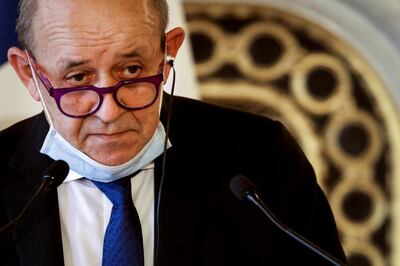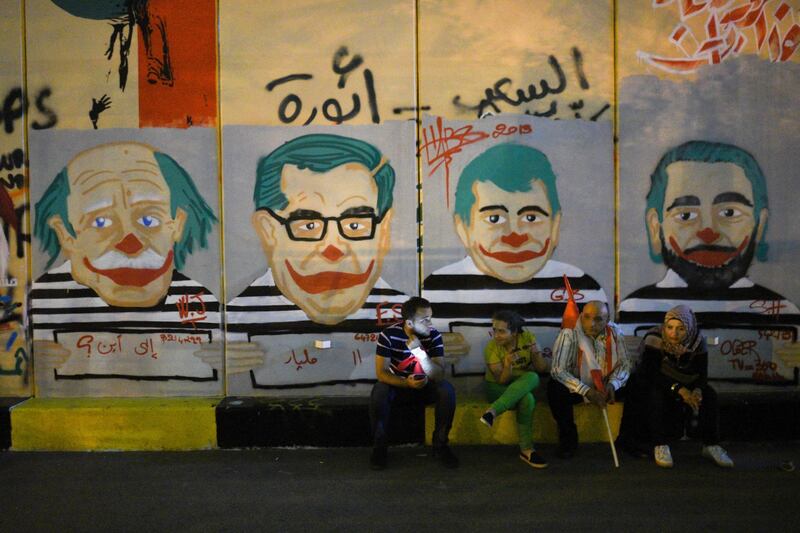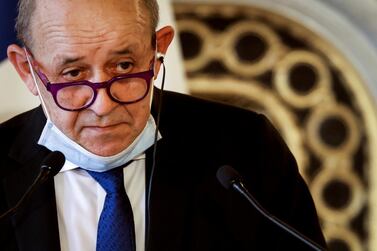Members of Lebanon's political elite have shrugged off thinly veiled threats by France to impose sanctions on them for failing to form a government capable of enacting reforms, after seven months of a power vacuum.
French Foreign Minister Jean-Yves Le Drian on Monday said there was a need to "reinforce pressure" on Lebanese leaders, two weeks after President Emmanuel Macron hinted at a tougher approach towards Lebanese politicians.
Mustapha Allouche, who is close to prime minister-designate Saad Hariri, said the threat of sanctions was not enough to convince politicians to act.
“This is a threat and a warning,” Mr Allouche said. “But will anything come out of it? It’s all talk.”

France has been at the forefront of relief and economic development in Lebanon for years, but disputes and self-interest among Beirut's political elite have impeded efforts to save the country’s economy.
Muted reactions from Lebanese politicians to Mr Le Drian's comments indicate how intractable the crisis in Lebanon has become, as foreign-backed parties refuse to compromise to form a government.
Mr Allouche said France was likely sending a warning to Gebran Bassil, son-in-law of Lebanon's President Michel Aoun and leader of the party Mr Aoun founded, the Free Patriotic Movement.
The party's alliance with militant group Hezbollah helped Mr Aoun to the presidency in 2016 and gave the Christian party political influence.
Mr Bassil is accused by Mr Hariri's Future Movement party of pressing Mr Aoun for a "blocking third" of Cabinet seats – the equivalent of a veto.
Mr Aoun and Mr Bassil deny the claim.
“In truth, French pressure is not in the right place because Gebran Bassil, who is blocking the formation of a government, is already sanctioned by the US,” said Mr Allouche, a former member of the Lebanese Parliament.
Seven months ago, Mr Macron launched an initiative to aid Lebanon, which is suffering a severe economic crisis.
This has been compounded by Covid-19 and a huge explosion at Beirut port that killed more than 200 people and unleashed angry protests that forced the government to resign.
But political leaders have failed to follow the French plan and agree on a reformist government, a requirement to unlock debt relief and aid payments.
Mr Le Drian's comments are his latest bid to revive Mr Macron’s initiative.
Diplomatic sources previously confirmed to The National that Europe was also exploring the possibility of sanctions.
"The minister has indicated to his European, regional and international counterparts that after seven months of deadlock, the time has come for reinforced pressure," Mr Le Drian said.
His position seems to be shared by the EU's Foreign Affairs Council.
"We share the concern expressed by France about the situation in Lebanon," the bloc's foreign policy chief, Josep Borrell, said last week.
Mr Le Drian's comments came after he spoke to Mr Aoun, Mr Hariri and Parliamentary Speaker Nabih Berri, the political leaders of Lebanon's three largest sects.
There was no public comment about the talks from any of the Lebanese leaders. Mr Berri's office declined to comment.
An official from Mr Aoun's office also declined to comment on the possibility of sanctions, saying that the talks “were fruitful on both sides”.
A Hezbollah spokesman told The National that the group hoped the French initiative would succeed but considered talk of pressure and sanctions to be unacceptable.
Analysts were also sceptical about the effectiveness of the French threats.
Imad Salamey, an associate professor at the Lebanese American University, said the threat had been made by the French too many times for politicians to react.
“The French have been threatening Lebanese politicians for more than a year now but nothing has materialised,” Mr Salamey said.
In any case, sanctions imposed on Lebanese politicians are unlikely to succeed unless their foreign backers are also pressured, he said.
Hezbollah and its allies are backed by Iran and Syria.
"The problem does not end with politicians in Lebanon," Mr Salamey said.
Another major issue is that France does not have enough influence against groups it may consider imposing sanctions against, said Mohanad Hage Ali, of the Carnegie Middle East Centre.
"There are growing European fears about the ongoing crisis but French leverage is pretty weak," Mr Hage Ali said.
A European politician told The National that France appeared to have overestimated its influence in Lebanon, and that the power vacuum in Beirut has allowed other international players to step in, undermining Mr Macron's role.
He said that although the French leader was exasperated, he must keep channels open with the politicians who France is threatening with sanctions.
"Russian-US relations are at rock bottom and Lebanon is developing into a playing field for other external actors, not just France," the source said.
Hezbollah and Mr Hariri had opened channels with Moscow and Turkey had started forging ties in Lebanon, the source said.
A parliamentary delegation from Hezbollah went on a four-day visit to Moscow this month.
"It is not exactly news that all the Lebanese political class is corrupt, that they do not care about putting together a plan to save the country," the European politician said.
"They put their personal gain above anything else."








